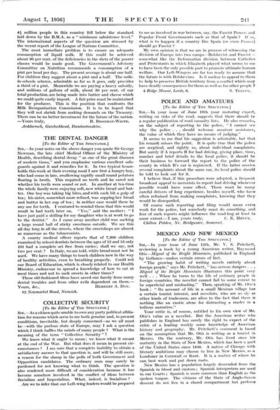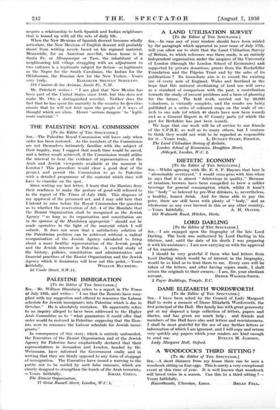MEXICO AND NEW MEXICO
[To the Editor of THE SPECTATOR.] SIR,—In your issue of June 12th, Mr. V. S. Pritchett, reviewing a book by a young American writer, Raymond Otis—Miguel of the Bright Mountain, published in England by Gollancz—makes certain errors of fact.
" The growing habit of writing novels entirely about foreign people," says Mr. Pritchett, " has serious dangers . . Miguel of the Bright Mountain illustrates this point very well . . . When he turns to the life of ordinary people in foreign countries, the novelist cannot fail to some extent to be superficial and misleading." Then, speaking of Mr. Otis's book : " Its account of life in a small Mexican village has a certain tourist interest, and novelists, who are as sly as other kinds of tradesmen, are alive to the fact that there is nothing like an exotic scene for distracting a reader in a tedious narrative."
Your critic is, of course, entitled to his own view of Mr. Otis's value as a novelist. But the American writer who publishes in England has surely the right to expect of the critic of a leading weekly some knowledge of American history and geography. Mr. Pritchett's comment is based on the assumption that Mr. Otis is writing as a tourist in Mexico. On the contrary, Mr. Otis has lived since his maturity in the State of New Mexico, which has been a part of the United States since 1848. A native of Chicago with literary ambitions may choose to live in New Mexico, as a Londoner in Cornwall or Kent. It is a matter of where he can best work and put down roots.
New Mexico has a population largely descended from the Spanish in blood and custom ; Spanish interpreters are used in. our Courts ; Spanish is more common than English as the spoken tongue. The citizens of the State of Anglo-Saxon descent do not live in a closed compartment but perforce
acquire a relationship to both Spanish and Indian neighbours that is bound up with all the acts of daily life. ; When the New Mexican of Spanish descent becomes wholly articulate, the New Mexican of English descent will probably desist from writing novels based on his regional material. Meanwhile, for an American novelist, whose home is in Santa Fe, or Albuquerque or Taos, the inhabitant of a neighbouring hill village struggling with an adjustment to two cultures is a legitimate subject for fiction—as legitimate as the Negro for the South Carolinian, the Indian for the Oklahoman, the Russian Jew for the New Yorker.—Yours Mr. Pritchett writes : " I am glad that New Mexico has been part of the United States since 1848, but this does not Make Mr. Otis a distinguished novelist. Neither does the fact that he has spent his maturity in the country he describes ensure that he will not foist upon the people of it ways of thought which are alien. Hence ' serious dangers ' to ' legiti- mate material.' "







































 Previous page
Previous page